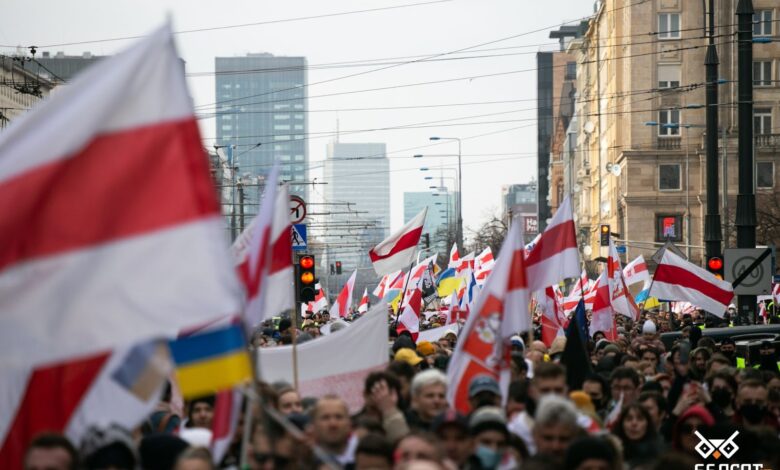March 25 – Freedom Day (not) celebrated in Belarus

Commemorated for over a century, Freedom Day (Дзень Волі – Dzien Voli in Belarusian) is virtually banned in Belarus. Why does this symbolic date bother the Lukashenko regime so much and why is it so celebrated by the Belarusian diaspora? Dr. Paterson Franco Costa, a researcher of Belarusian language and culture, explains a bit of the troubled history behind this date, hard to grasp even for Belarusians themselves.
Folk wisdom maintains that Belarus has existed since the beginning of time, when Piarun, one of the main deities of the Slavic pantheon, touched a stone and brought it to life. However, it was only on the morning of March 25, 1918, that the world saw the emergence of an independent country with that name for the first time. The Belarusian Democratic Republic (BDR) was proclaimed amid World War I when several other European nations, such as Ukraine, Poland, Finland, and Ireland, gained their independence. Unlike them, the BDR did not last long, at least not territorially. In 1920, its government, the Rada, had to flee from the Russian invasion in the east and the Polish invasion in the west. Since then, it has existed as the world’s oldest government in exile.
So, why does March 25 matter for the Belarusian people?
Despite its troubled and, in essence, short existence, the BDR has crucial importance in the construction of the Belarusian nation. It is not an exaggeration to say that without it the current Republic of Belarus wouldn’t have existed. Before the Soviet occupation, Belarus was occupied by the Russian Empire in the form of various governorates at serious risk of being carved up by the surrounding Soviet republics. Thanks to the BDR, that didn’t come to pass. Under centuries-old national symbols – the white-red-white flag and the Pahonia coat of arms – the Belarusian people united and showed the world that they would always fight for their right to exist.
It is interesting to note that these symbols date back to the Grand Duchy of Lithuania, one of the largest European states of all time, whose dominant language was Belarusian. The GDL later united with the Kingdom of Poland, thus forming a politico-military alliance known as the Commonwealth of Two Nations. This alliance was based on common interests of mutual defense against threats from both the west (the Teutonic order) and the east (Russians). Thus, the national idea of the BDR is based on a discourse that existed long before the Russian invasion, augmented by the adoption of democratic values, freedom of expression and religion, among other principles shared with other Western nations.
Averse to such principles, the Bolsheviks tried to dismantle the BDR as soon as they occupied the territory of Belarus in 1920. In its place, they created the Byelorussian Soviet Socialist Republic, or BSSR, in an attempt to erase Belarusian history and identity, to then rewrite it according to Muscovite interests. According to this discourse, the Belarusian people was created as a result of the October Revolution, coming out as a rural populace barely having a history. Its symbols were replaced by a red-green banner and a Soviet-style coat of arms. The white-red-white flag and Pahonia coat of arms would be reinstated only decades later, as the USSR collapsed, but then again, not for long.
1994 and the democracy yet to come
In 1994, a historian became the first democratically elected president of Belarus. Guided by the Soviet discourse, Alexander Lukashenko reimposed the symbols of the BSSR, albeit slightly modified, and initiated a series of political changes that gave him virtually unlimited power, as he brought Belarus dangerously close to its eastern neighbor. One of these changes was the de facto prohibition of the March 25 celebrations. In turn, Belarus is the only country in the world where the October Revolution is still a public holiday with large-scale public celebrations, all supervised by the KGB, another Soviet vestige that only Belarus preserves.
On the other hand, the Belarusian diaspora celebrates Freedom Day worldwide, without the shackles of the Lukashenko regime. Performances, marches, cultural, sports, and academic events take place simultaneously in all the corners of the world, carrying a message of hope and unity for those people who believe that democracy and human rights in Belarus shall prevail.